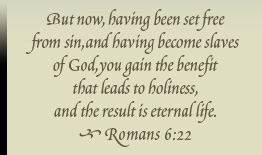



Surrender To Christ
By John Currier
How do we surrender to Christ? What must we do to become a Christian and follow after our Savior? Is it required that we study the Bible for years and be able to quote references at any moment? Must we make animal sacrifices? Light candles? Kiss snakes? Let's look at the book of Job, chapter 7, verse 20: "I have sinned; what shall I do unto Thee, O Thou preserver of men?"
It would have been easy enough for Job to have defended himself before men, but not so before the Lord. Although, in the beginning of the book even the Lord had said how righteous Job was, but Job used another tone when bowing before God. When he said, "I have sinned," he knew in his heart that he was not truly up to God's standards. He felt very lowly and humbly bowed. These words that Job uttered are easily said and are said by many, but unless they come from a contrite and repentant heart they simply lay more sin on the guilt already there. And this is where we are now.
The Confession: "I have sinned."
In words this is no more than a hypocrite might say. Aren't there many who call themselves "miserable sinners" who are, never the less, simply despicable mockers? But God, seeing that Job's heart was in the right way, accepted Job's confession.
It was a personal confession from Job to God. It was not a confession to his fellow men, but to the Preserver of men. It was not one that blamed others for causing him to sin or blamed them for misinformation, or for lack of blessings from God. It was to the Lord and it was an admission of his own sins. Job saw what his life was and how insignificant it was it relationship to God. He saw the greatness of God and surrendered himself through this confession to God. What brought this confession? The Holy Spirit, for in verse 18 Job ascribes his grief to the visitation of God.
It was a feeling. He was cut to the quick by it. He was overcome with guilt by his own self-righteousness. He had thought of himself as being so very important, but after listening to God, he realized how short he had come of actually measuring up to what God expected of him. This also happens to each of us who come to the Lord in faith and trust for forgiveness.
One of the things we should glean from this passage is that Job had the faith and trust that the Lord would forgive him. He never doubted that whatever the Lord decided to do was right.
The Inquiry: "What shall I do unto Thee?"
In this question we see that Job is willing to do whatever the Lord might demand of him, thus proving his earnestness. He was beside himself as to what to do. He felt strongly that he should offer a sacrifice or go to some far away place or something must be done. Notice that he doesn't try to make a deal with the Lord. He doesn't say that if the Lord will do this or that, then Job will admit his sins. He makes no conditions, but only begs to know the Lord's terms.
A Title: "O Thou Preserver of Men!"
The Lord is aware of each and every one of us--- and what we have done and what we are doing. Nothing is hidden from God. Therefore, Job knew that the Lord knew him and knew him intimately--- every secret--- every thought, just as He knows us today. The Lord knew of his suffering and his desire for pardon and forgiveness and his utter helplessness. Job had no need to pursue and list all the sins that he had committed, but simply say "I have sinned." This confession from a humble mind and a humble spirit is what the Lord wanted to hear.
Notice that as soon as Job had confessed his sin he asked what he should do. There are those who sometimes are caught up in emotion of a sermon, or song or prayer and they go to the Lord asking for forgiveness, but they never follow up with the question, "What shall I do, Lord?" They want the forgiveness but they don't really want to change their ways. They have intentions of "doing right" at that moment but they don't want to actually know what the Lord really expects of them. This is actually worse, possibly, than no confession at all for this tells the Lord that one knows what he/she has been doing is wrong, but truly doesn't want to change---just receive forgiveness for now.
There are a number of persons in the Bible that are described as being "perfect", such as Noah. Noah was perfect for his generation, but no drunkard will allow us to forget that he had his fault. Abraham received the command, "Walk before me and be thou perfect," but he was not absolutely sinless. Zachariah and Elizabeth, the parents of John the Baptist, were described as being blameless, and yet there was enough unbelief in Zachariah to make him dumb for nine months. Job was one of those whom the Scriptures describe as "perfect," yet he cried, "I have sinned."
The doctrine of sinless perfection in the flesh is not of God, and he who makes his boast of possessing such perfection has at once declared his own ignorance of himself and the Law of the Lord. Nothing declares an evil heart more surely than glorying in its own goodness. He who proclaims his own praise reveals his own shame.
Man is in himself so feeble a creature, that it's a great wonder that he has not long ago been crushed by the elements, exterminated by wild beasts, destroyed by disease, or destroyed himself. God has bowed Himself to mankind's preservation and I believe that the same Preserver of men who has thus guarded the race watches with equal care over every individual.
The unconditional surrender implied in the question, "What shall I do unto Thee?" is absolutely essential from every person who hopes to be saved. God will send the Word to you; He will give you leaders to explain the passages; He will open every door, for He loves each of us. But the sinner must deliver himself up and first believe that the Lord is God and then admit that he is a sinner and trust in the clemency of Christ. Until this is done the battle will continue; for the first requisite for peace with God is complete submission.
Don’t hesitate to share these papers with friends and associates, always include this and the following paragraph in all copies. Please ask for permission before reproducing the content in any form.
Copyright © 1999-2014 Freedom Ministry. All rights reserved. No part of this publication may be reproduced in whole, or in part, without the express written consent of the publisher, Freedom Ministry.
![]() Contact Us
Contact Us ![]()
Pastor Dianne D. McDonnell
Freedom Ministry
P.O. Box 976
Marble Falls, Texas 78654
Voice Mail: 512-302-6707